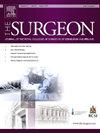急诊普通外科手术交接及其对病人护理的影响。
IF 2.3
4区 医学
Q2 SURGERY
Surgeon-Journal of the Royal Colleges of Surgeons of Edinburgh and Ireland
Pub Date : 2025-05-26
DOI:10.1016/j.surge.2025.05.004
引用次数: 0
摘要
背景:手术交接是患者护理的一个关键风险领域,然而初级团队成员参与这一过程的影响尚未得到很好的理解。本研究旨在评估实习生在急诊普外科(EGS)工作交接中的参与程度及其对日常工作的影响。方法:采用公开的、结构化的、非参与性的观察方法,对上午的EGS交接会议进行评估。然后,这些实习生在交接后的白班进行观察。在这些观察期间,记录了所有向实习生提出的病人护理问题的细节。结果:在6次EGS交接会议中观察到5名普外科实习生(42%)。在25小时的观察中,共记录了100例临床询问。只有2/6的交接会议有实习生全程参与。虽然所有人在交接过程中都表现得很积极,但在4月6日和3月6日的交接期间,实习生分别提出了问题,并提供了反馈。直接向充分参与早间交接的实习生提出的临床问题更有可能立即得到回答(96.6%,n = 29 vs. 78.6%,n = 55;P = 0.024)和使用言语切换记忆(50%,n = 15 vs 24.3%,n = 17;p = 0.012)。由于在交接过程中遗漏了患者的过敏信息,发生了一个可忽略不计的伤害事件。结论:充分参与交接的实习生表现出学习能力,更有可能更快地根据记忆对问题做出反应。减少对呼叫后交接过程的参与有可能延迟,从而对患者护理产生负面影响。本文章由计算机程序翻译,如有差异,请以英文原文为准。
Intern involvement in emergency general surgical handover and implications for patient care
Background
Surgical handover is a key risk area in patient care, yet the impact of junior team member involvement in the process is not well understood. This study aims to assess the level of intern involvement in emergency general surgery (EGS) handover and its impact on daily tasks.
Methods
Overt, structured, non-participant observations of morning EGS handover meetings were carried out to assess intern involvement. The same interns were then observed over the course of the day-shift immediately following the handover. During these observation periods, details of all patient care queries addressed to the interns were recorded.
Results
Five general surgery interns (42%) were observed across six EGS handover meetings. A total of 100 clinical queries were recorded during 25 h of observation. Only 2/6 handover meetings had full intern involvement. While all appeared to be actively listening during handover, questions were asked, and readbacks were provided by interns during 4/6 and 3/6 handovers, respectively. Clinical queries directed at interns who were fully involved in the morning handover were more likely to be answered immediately (96.6 %,n = 29 vs. 78.6 %,n = 55; p = 0.024) and using memory of the verbal handover (50 %,n = 15 vs 24.3 %,n = 17; p = 0.012). One incidence of negligible harm occurred, due to omission of a patient's allergy information from the handover.
Conclusion
Interns who are fully involved in handover show evidence of learning and are more likely to respond to queries faster and from memory. Reduced involvement in the post-call handover process has the potential to delay, and therefore negatively impact, patient care.
求助全文
通过发布文献求助,成功后即可免费获取论文全文。
去求助
来源期刊
CiteScore
4.40
自引率
0.00%
发文量
158
审稿时长
6-12 weeks
期刊介绍:
Since its establishment in 2003, The Surgeon has established itself as one of the leading multidisciplinary surgical titles, both in print and online. The Surgeon is published for the worldwide surgical and dental communities. The goal of the Journal is to achieve wider national and international recognition, through a commitment to excellence in original research. In addition, both Colleges see the Journal as an important educational service, and consequently there is a particular focus on post-graduate development. Much of our educational role will continue to be achieved through publishing expanded review articles by leaders in their field.
Articles in related areas to surgery and dentistry, such as healthcare management and education, are also welcomed. We aim to educate, entertain, give insight into new surgical techniques and technology, and provide a forum for debate and discussion.

 求助内容:
求助内容: 应助结果提醒方式:
应助结果提醒方式:


